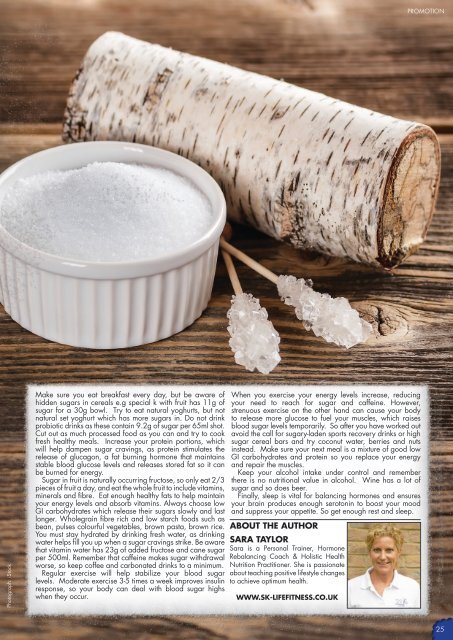Obese Britain 2015.pdf
You also want an ePaper? Increase the reach of your titles
YUMPU automatically turns print PDFs into web optimized ePapers that Google loves.
PROMOTION<br />
Photograph: iStock<br />
Make sure you eat breakfast every day, but be aware of<br />
hidden sugars in cereals e.g special k with fruit has 11g of<br />
sugar for a 30g bowl. Try to eat natural yoghurts, but not<br />
natural set yoghurt which has more sugars in. Do not drink<br />
probiotic drinks as these contain 9.2g of sugar per 65ml shot.<br />
Cut out as much processed food as you can and try to cook<br />
fresh healthy meals. Increase your protein portions, which<br />
will help dampen sugar cravings, as protein stimulates the<br />
release of glucagon, a fat burning hormone that maintains<br />
stable blood glucose levels and releases stored fat so it can<br />
be burned for energy.<br />
Sugar in fruit is naturally occurring fructose, so only eat 2/3<br />
pieces of fruit a day, and eat the whole fruit to include vitamins,<br />
minerals and fibre. Eat enough healthy fats to help maintain<br />
your energy levels and absorb vitamins. Always choose low<br />
GI carbohydrates which release their sugars slowly and last<br />
longer. Wholegrain fibre rich and low starch foods such as<br />
bean, pulses colourful vegetables, brown pasta, brown rice.<br />
You must stay hydrated by drinking fresh water, as drinking<br />
water helps fill you up when a sugar cravings strike. Be aware<br />
that vitamin water has 23g of added fructose and cane sugar<br />
per 500ml. Remember that caffeine makes sugar withdrawal<br />
worse, so keep coffee and carbonated drinks to a minimum.<br />
Regular exercise will help stabilize your blood sugar<br />
levels. Moderate exercise 3-5 times a week improves insulin<br />
response, so your body can deal with blood sugar highs<br />
when they occur.<br />
When you exercise your energy levels increase, reducing<br />
your need to reach for sugar and caffeine. However,<br />
strenuous exercise on the other hand can cause your body<br />
to release more glucose to fuel your muscles, which raises<br />
blood sugar levels temporarily. So after you have worked out<br />
avoid the call for sugary-laden sports recovery drinks or high<br />
sugar cereal bars and try coconut water, berries and nuts<br />
instead. Make sure your next meal is a mixture of good low<br />
GI carbohydrates and protein so you replace your energy<br />
and repair the muscles.<br />
Keep your alcohol intake under control and remember<br />
there is no nutritional value in alcohol. Wine has a lot of<br />
sugar and so does beer.<br />
Finally, sleep is vital for balancing hormones and ensures<br />
your brain produces enough serotonin to boost your mood<br />
and suppress your appetite. So get enough rest and sleep.<br />
ABOUT THE AUTHOR<br />
Sara Taylor<br />
Sara is a Personal Trainer, Hormone<br />
Rebalancing Coach & Holistic Health<br />
Nutrition Practitioner. She is passionate<br />
about teaching positive lifestyle changes<br />
to achieve optimum health.<br />
www.sk-lifefitness.co.uk<br />
25



